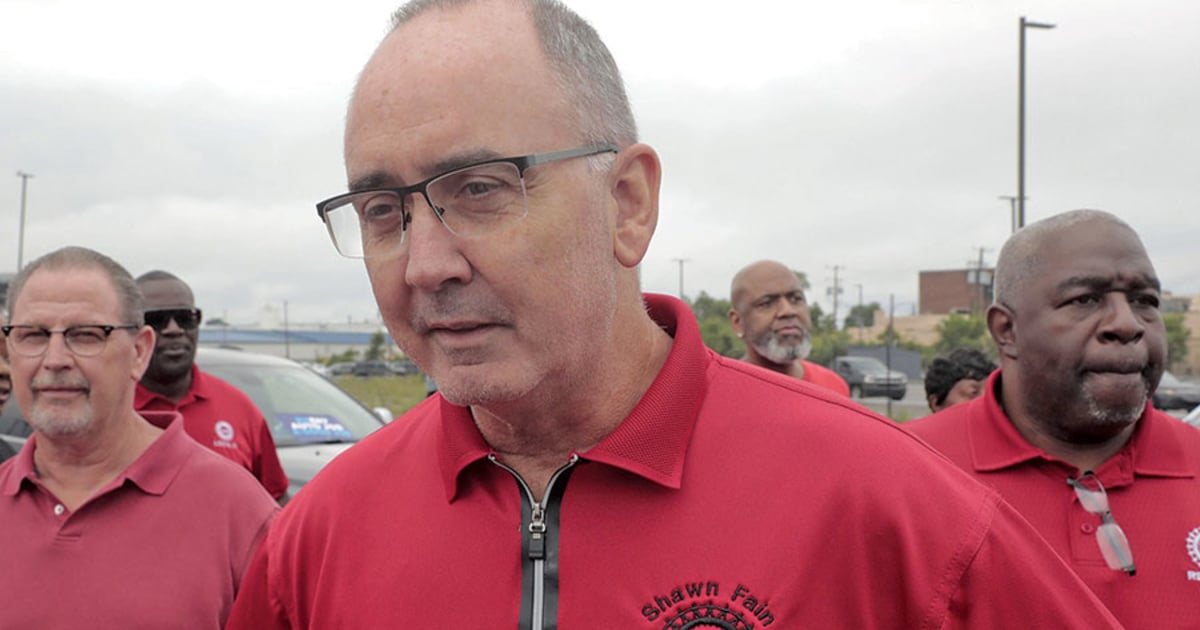
With a Sept. 14 contract deadline approaching, the UAW has accused two of the Detroit 3 of refusing to bargain fairly and the third of insulting workers with a lowball offer.
The hostility caught the automakers off guard during what already have been unusually contentious negotiations, heightening fears that the union will call a strike during the Detroit auto show that could cost the companies and their suppliers billions of dollars.
Ford Motor Co. — the only one of the three companies that UAW President Shawn Fain acknowledges to be bargaining in good faith — publicly detailed what it called a “generous” package that would give senior employees $98,000 in wages, overtime and bonuses over the next year alone.
Meanwhile, General Motors and Stellantis disputed the union’s complaints to the National Labor Relations Board that they’re engaging in unfair labor practices. The charges filed by the UAW this week are a weapon that the union and Detroit 3 have wielded against each other only a handful of times over the decades.
“Our goal is to bargain a fair contract, but if we have to strike to win economic and social justice, then we will,” Fain said on a livestream via Facebook this week. “I know our demands are ambitious, but I’ve told the companies repeatedly, I’m not the reason that member expectations are so high. You can’t make a quarter trillion dollars in North America profits over the last decade and expect us to keep aiming low and settling lower.”
Ford’s proposal, though short of what the UAW has demanded, is more lucrative than the outgoing contract signed in 2019.
The automaker said it was offering to give workers 9 percent raises over the course of four years, in addition to bonuses that would increase their pay by at least 15 percent overall. Ford said the raises would be the largest for its UAW members in more than two decades.
Workers would see earnings rise to $92,000 in the first year of the contract from an average of $78,000 in 2022, including overtime and lump sums, Ford said. They also would receive $38,000 worth of health care coverage and other benefits, Ford said.
“This would be an important deal for our workers, and it would allow for the continuation of Ford’s unique position as the most American automaker — and give us the flexibility we need within our manufacturing footprint to respond to customer demand as the industry transforms,” CEO Jim Farley said in a statement. “This offer would also allow Ford to compete, invest in new products, grow and share that future success with our employees through profit-sharing.”
But Fain said Ford’s proposed deal “not only fails to meet our needs, it insults our very worth.”
Ford has offered to reduce the length of time it takes a new hire to receive top wages to six years from eight, while the UAW wants to effectively eliminate the grow-in period.
Additionally, Fain said Ford wants unlimited use of temporary workers, although it offered to bump their starting pay to $20 an hour, from about $16 today. Fain said Ford refused to reinstitute cost-of-living wage adjustments, will not increase retiree pay and will not agree to the UAW’s demand for a program that would give workers their normal pay during a layoff.
He said Ford wants to change the current profit-sharing formula, which pays workers $1 for every $1 million in pretax North America profits. Under Ford’s proposed formula, Fain said, workers would have earned 21 percent less than they did the past two years.
The automaker declined to reveal its profit-sharing offer publicly. Ford no longer reports its financial results by region, so the current formula is no longer usable.
“The proposal Ford offered us is garbage,” said Nicholas Brooks, a member of UAW Local 862 at Ford’s Kentucky Truck Plant. “I can’t believe they want to cut some of our profit sharing, cut the sign-on bonus down, and they definitely need to be helping the retirees more.”
Art Wheaton, a professor and labor expert at Cornell University, said Ford’s proposal doesn’t stack up to deals recently signed outside the auto industry, such as the Teamsters’ new contract with UPS.
“It may be better by historical standards, but I don’t think Shawn Fain is wrong saying it’s not an adequate proposal,” he said. “It’s a reasonable offer, it’s not a good offer.”
Officials from GM and Stellantis said they were taken aback by the union filing charges of unfair labor practices against the companies.
“This is a claim with no basis in fact, and we are disappointed to learn that Mr. Fain is more focused on filing frivolous legal charges than on actual bargaining,” Stellantis said in a statement. “We will vigorously defend this charge when the time comes, but right now we are more focused on continuing to bargain in good faith for a new agreement.”
“We are surprised by and strongly refute the NLRB charge filed by the International UAW,” GM said in a statement attributed to Gerald Johnson, executive vice president, global manufacturing. “We believe it has no merit and is an insult to the bargaining committees.
Our goal remains the same — to achieve an agreement without a disruption that rewards our team members and protects the future of the entire GM team.”

